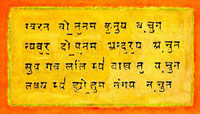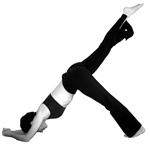
health
Do You Really Need Sanskrit to Benefit from Yoga?
 So, you want to take a yoga class. You’ve read about it, talked to friends about it, and maybe have seen a class in the gym. But something is holding you back. Maybe you think you’re not flexible enough. That’s a common myth. Or just maybe you heard a yoga teacher using words like “Adho Mukha Svanasana” or “Trikonasana”, and you turned your back on the class. It seemed a little too intimidating, a little too weird and you can’t figure out how you’d keep up.
So, you want to take a yoga class. You’ve read about it, talked to friends about it, and maybe have seen a class in the gym. But something is holding you back. Maybe you think you’re not flexible enough. That’s a common myth. Or just maybe you heard a yoga teacher using words like “Adho Mukha Svanasana” or “Trikonasana”, and you turned your back on the class. It seemed a little too intimidating, a little too weird and you can’t figure out how you’d keep up.
What you’re hearing is Sanskrit, the name given to an ancient classical language of the Hindu inhabitants of India. It was introduced into  India probably about 1500 B.C. and has become the language of yoga.
India probably about 1500 B.C. and has become the language of yoga.
Like any language, it has been translated into a variety of languages, including English. So do you really need Sanskrit to enjoy yoga? I don’t think so. For the individual who just wants to reap the many positive mental and physical benefits that yoga has to offer, Sanskrit is not necessarily essential to the experience.
Benefits of Yoga
When you practice yoga, you enjoy a myriad of benefits. First and foremost, the practice of yoga allows you to breathe. Really breathe. You will learn a new how to inhale and exhale with full, deep breaths, allowing you to soften so that you become more calm and completely relaxed.
Yoga works as a full body massage. Think of any part of your the body, and something wonderful will happen. Yoga affects your nervous system, your digestive system and your spine. And that’s just for starters. Depending on how you move, yoga may help you to lengthen your spine, allowing you to stand taller. It can also help your body become more supple, stronger and more  flexible.
flexible.
Add to that, the potential to:
- Improve your balance.
- Release tension in the spine.
- Increase overall stamina and strength.
- Lubricate your joints and muscles.
- Strengthen your lower back.
- Relax your neck.
Yoga may also help you lower your blood pressure, relieve depression and decrease anxiety. Put another way, yoga has an extraordinary potential to ease your mind.
A good yoga teacher can guide you through the variety of movements, whatever they are called. As a student, all you need to do is follow, listen and breathe. And you don’t need to know the Sanskrit name of each and every pose. Sanskrit is a wonderful language that can add richness to a yoga practice, but it’s no prerequisite for deriving pleasure and benefit from yoga.
Susan Kramer, RYT200 is a certified yoga instructor (Yoga Heals) who lives in Annapolis, Maryland. She knows firsthand of the healing powers of yoga.
© 2006-2013 ConceptDesign, Inc. Terms of Use
BoomSpeak - For babyboomers - by babyboomers.